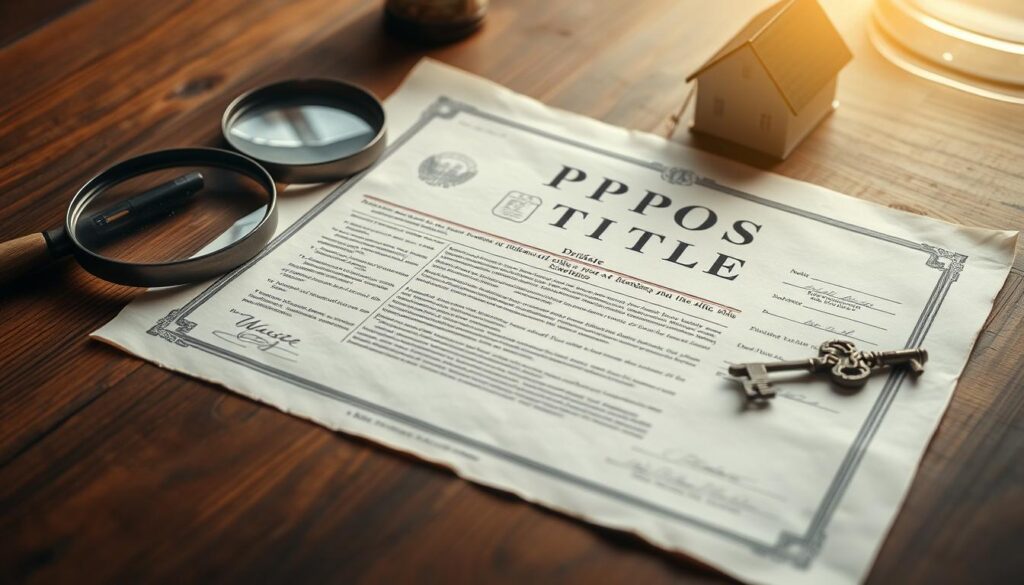
Buying a property is a big deal. It’s important for buyers to know the legal side of things. This article gives you key tips for buying property. It helps you understand the process and protect your investment.
From dealing with title issues to knowing zoning laws, these tips are here to help. They empower you to make smart choices and avoid risks.
A modern office scene with a diverse group of professionals analyzing real estate documents, surrounded by architectural models and blueprints, sunlight streaming through large windows, creating a warm and inviting atmosphere.
Key Takeaways
- Understand property titles and ownership rights to avoid future complications
- Carefully review the real estate contract to protect your interests
- Research zoning laws and property use restrictions to ensure compliance
- Familiarize yourself with property tax assessments and financial obligations
- Seek professional legal advice to navigate the complex real estate landscape
Understanding Property Titles and Ownership Rights
When you buy a property, knowing about the property title and ownership rights is key. This knowledge helps you avoid problems and makes the buying process smoother.
Types of Property Ownership
There are many types of property ownership, each with its own rules. Here are a few:
- Fee simple: The owner has full and unlimited rights to the property.
- Tenancy in common: Several owners share the property, each with their own part.
- Joint tenancy: Several owners share equal rights and duties for the property.
- Condominium: The owner has their own unit and shares common areas with others.
Common Title Issues to Watch For
When doing a title search, watch out for possible problems. These can affect your ownership rights. Some issues include:
- Liens or encumbrances: Unpaid debts or claims on the property.
- Easements: Rights given to others to use part of your property.
- Zoning restrictions: Rules on what you can do with the property.
- Boundary disputes: Arguments over where the property lines are.
Title Insurance Importance
Title insurance is a must to protect against these issues. It covers legal costs and financial losses from title problems. It helps keep your ownership safe and secure.

A detailed, aged property title document spread out on a wooden table, surrounded by a magnifying glass, a vintage key, and a small house model; soft natural light illuminating the scene, creating a sense of history and authenticity.
“Investing in title insurance is a small price to pay for the assurance that your property rights are protected.”
Legal Tips Real Estate Contract Review Process
Going through the real estate contract review process can feel overwhelming. But, with the right information and help, buyers can safeguard their interests and make the transaction smooth. Here are some key legal tips to remember:
- Understand Key Contract Clauses: Take the time to read the real estate contract carefully. Look for important parts like contingencies, closing dates, and any extra fees. Make sure these match what you want and expect.
- Negotiate Favorable Terms: It’s okay to ask for changes in the contract if something doesn’t work for you. Work with your real estate agent and lawyer to suggest changes that protect your side.
- Prioritize Professional Legal Advice: Get advice from a skilled real estate lawyer to check the contract. They can spot potential problems and make sure your rights are looked after during the closing process.
- Carefully Evaluate Contingencies: Contingencies, like financing and home inspections, are key in the real estate contract. Make sure they are clear and give you the room to deal with any issues that come up.
By using these legal tips, you can confidently go through the real estate contract review process. This way, you can reduce risks and protect your interests as a buyer.
“A thorough legal review of the real estate contract is essential to ensure a successful and stress-free transaction for the buyer.”
Zoning Laws and Property Use Restrictions
Understanding real estate transactions means knowing the legal and regulatory world. Buyers must think about zoning regulations and property use restrictions when buying a property.
Local Building Codes and Regulations
It’s key to know the building codes and rules of the local area before buying. These rules say what can be built, what materials to use, and safety standards. Not following these land use rules can lead to delays, fines, or not getting permits.
Future Development Impact
Smart buyers check the area’s future development. Zoning regulations decide if land will be for homes, businesses, or factories. Knowing these property restrictions helps buyers make smart choices and avoid surprises.
Property Use Limitations
- Rules on what can be built, like houses or shops
- Size, height, or density limits on a property
- What you can use a property for, like living or selling things
- Needs for space, parking, and green areas
Understanding zoning regulations and property use restrictions helps buyers make good choices. This protects their investment and meets their long-term goals.
Property Tax Assessment and Financial Obligations
Buying property is more than just the initial cost. You also have ongoing financial duties, like property taxes. Knowing how taxes are assessed and planning for them is key to good real estate management.
Property taxes can be a big expense. They change based on where you live, your property’s value, and local tax rates. It’s important to learn about tax assessments in your area. This way, you can prepare for these payments and avoid surprises.
Real estate ownership also means other costs, like maintenance, utilities, and insurance. Budgeting and planning are essential to handle these expenses. Being proactive helps you manage your money better and enjoy owning property.










